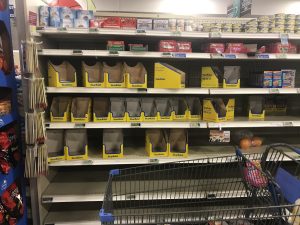News and Announcements
Press Release – As Canned Tuna Fly Off Shelves, Operations of US Boats Are Compromised (17 March 2020)
 HONOLULU (17 March 2020) Consumers bracing against Covid-19 have raised demands not only for health and safety products but also for many food staples, including tuna. According to an NPR report yesterday, tuna sales were up more than 31 percent last week compared to the same time last year.
HONOLULU (17 March 2020) Consumers bracing against Covid-19 have raised demands not only for health and safety products but also for many food staples, including tuna. According to an NPR report yesterday, tuna sales were up more than 31 percent last week compared to the same time last year.
StarKist Samoa, located in the US Territory of American Samoa, supplies tuna for the US market.
“The StarKist Samoa operation relies on the US tuna fishermen, and direct fish deliveries to the cannery are a major component of our business model,” said StarKist Samoa in a statement today. “We have seen an increase in sales that has been attributed to Covid-19 impact, and we are doing our best to keep up with the demand. It’s important to note that the global impact of Covid-19 highlights the importance of keeping US suppliers and producers in business to ensure we can sustain the tuna supply for US consumers. It continues to be a struggle for the US tuna fisherman to stay in business. The Pacific Remote Islands Marine National Monument, as well as the continued burdens of the international fishing restrictions, has had a detrimental impact on both our US tuna fishermen and the American Samoan economy. In addition, these measures have had little or no impact on tuna conservation or the protection of sensitive marine habitats. Any interruption to the StarKist Samoa supply chain impacts our company’s ability to provide healthy seafood products to our US customers.”
Under US law, American tuna purse-seiners are stringently managed under regulations and enforcement regimes that are far more robust than those of other nations. Among the regulations for US purse-seiners is the requirement for vessels to carry fishery observers.
“The current situation poses critical problems for the operation of the US tuna purse-seine fleet on almost every level,” notes Bill Gibbons-Fly, executive director of the American Tunaboat Association (ATA). The nonprofit organization, established in 1917, represents the owners and operators of the US Pacific tuna purse-seine fleet and is the last true distant-water fishing fleet operating under US flag. “Most Pacific Island countries that provide observers have pulled those observers off boats and called them home,” Gibbons-Fly adds. “We expect others to follow. The increasing travel constraints throughout the Pacific are complicating efforts to get crew, repair parts, technicians and supplies to boats in a timely fashion. And some ports where the boats would offload or transship fish are simply closed to them. This combination of factors not only puts the immediate operations of the fleet at risk, but also raises questions about the ability of this industry, along with many others, to overcome the broader economic and social disruption caused by the current pandemic.”
For further information contact Gibbons-Fly at (410) 940-9385 or wgibbons-fly@atatuna.com and Archie Soliai, government and community relations manager, StarKist Samoa, at Archie.Soliai@StarKist.com. Soliai is the chair of the Western Pacific Regional Fishery Management Council and the government and community relations manager for StarKist Samoa.
____________________________________________________________________________
American Tunaboat Association • 1 Tuna Lane San Diego, California 92101 • Tel (619) 233-6407 • http://atatuna.com
StarKist Samoa • PO Box 368, Pago Pago, AS 96799
Western Pacific Regional Fishery Management Council
A Council authorized by the Magnuson Fishery Conservation and Management Act of 1976
1164 Bishop Street, Suite 1400, Honolulu, Hawai`i • Tel (808) 522-8220 • Fax (808) 522-8226 • www.wpcouncil.org
Click here for printable PDF
